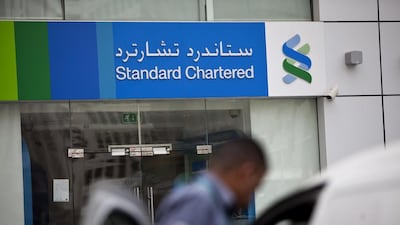International banks are retreating from small business banking, leaving the market increasingly in the hands of local lenders.
Standard Chartered's plans to sell off its SME loan portfolio is the latest milestone in that migration.
Such a shift comes in spite of an increasing push by UAE authorities to stimulate the SME sector as part of a strategy to diversify the economy and decrease reliance on oil revenues.
Bloomberg reported last week that StanChart was in discussions with five local banks for the sale of about 80 per cent of its SME loan book, said to be worth US$400 million.
The bank declined to comment, StanChart’s pullback from the sector is ostensibly in response to a fresh censure last month by US regulators, who deemed that the bank had not done enough to flag up potentially risky transactions stemming from accounts in the UAE and Hong Kong.
However the bank says it had long been considering its position in the UAE SME market, in the face of stiffening competition from local banks.
Indeed it appears as if the bank has been reducing its exposure to the sector over the past two years by cutting ties with some smaller businesses.
The Dubai-based modelling and events company Lush Group ME is one such business. The company, which has an annual turnover of around Dh3 million, had its StanChart business account terminated in 2012 while its trade licence was being renewed, with the bank refusing to reopen the account after the renewal had been processed.
“There was zero warning,” said Kelly Marie Hodgkin, the company’s chief executive. “When we tried to open the account again when the licence was renewed we were told that we weren’t able to open an account with them again.”
The company subsequently began a banking relationship with RAKBank.
StanChart is not the only international bank to pull back from the SME sector. Last year HSBC raised the ire of several small businesses, when it terminated several accounts with little warning.
The retreat from the sector comes as both banks have been hit hard by US regulators for historic lapses in their compliance and anti- money laundering controls, making both less willing to deal with smaller companies with perceived higher risk profiles.
StanChart was fined a total of $667m in 2012 from four separate US regulators, who accused the bank of sanctions-busting behaviour with Iran, Burma, Sudan and Libya, among others.
In December of that year, HSBC agreed a then record $1.9bn settlement with American prosecutors for flouting regulations relating to money-laundering in Mexico, and doing business with Iran.
However, the pullback by both banks from the sector is unlikely to leave SMEs without options., with local banks upping their SME offerings following increased government focus on boosting the sector.
In April, Sheikh Khalifa, President of the UAE, approved a federal law that included a requirement for federal authorities and ministries to contract at least 10 per cent of their procurement budget for purchasing, servicing and consulting to SMEs.
Sultan Al Mansouri, the Minister of Economy, said in April that he hoped that the contribution of the sector to the non-oil economy would rise to 70 per cent by 2020, from its current level of 60 per cent.
“In 2009 there were few banks serving the SME space. Nowadays more than 30 are serving the SME business,” said Mahdi Kilani,the head of business banking at Abu Dhabi Islamic Bank.
“This perception that banks don’t fund SMEs is almost like a myth, almost every major bank in the country is serving the SME sector.”
But while local banks are keen to serve the SME sector, they still appear more reticent to lend to it.
While SMEs represent almost 92 per cent of registered companies in the UAE, they account for just 3 per cent of total loans by banks.
Such a low figure is in part reflective of the fact that SMEs’ funding requirements are lower than their larger counterparts, according to Natasha Abdulelah, the head of SME banking at Commercial Bank International.
“A lot of these SMEs don’t really need that much cash, sometimes it’s a cash management programme that they need more,” she said.
“You have to see what their requirements are, it’s very important to not overfund them. You don’t want them to get into a vicious lending circle, they need to be stable.”
SME loans account for more than 3 per cent of CBI’s total loan book, she said, declining to give further details.
SMEs in the UAE remain under-regulated and therefore risky loan propositions for local lenders, according to a senior Dubai-based banker who did not want to be named.
“These companies are often shell companies or individually owned companies, with little corporate governance and only basic accounting practices,” he said.
“There’s very little regulation and often they have relationships we’re not able to find out about. It’s challenging from the compliance perspective, we don’t know where money’s sourced.”
Despite the government’s best efforts to date, the UAE’s SME sector remains at a nascent stage compared more developed economies, according to John Mullins, a faculty member in entrepreneurship at the London Business School.
“The culture in the UAE is not what it is in Germany or Italy, for example, where you have a long tradition of the backbone of the economy built around medium- sized companies, such as the Mittelstand in Germany,” he said. “You don’t really see such a culture in the UAE at this point.”
jeverington@thenational.ae
* with additional reporting by Mahmoud Kassem
Follow The National's Business section on Twitter

